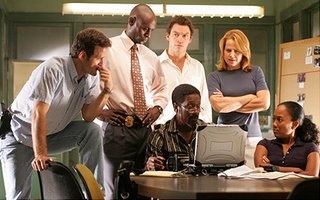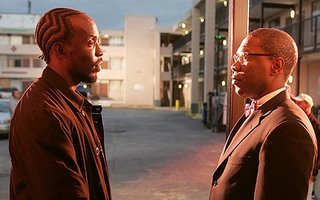Termite Television: The Wire

It's sort of perfect that The Wire is about selling and taking drugs: it is, without question, the most addictive television show in history. While watching season two on DVD I became so transfixed that I spent all night watching the last six episodes; the sun was up before I finally went to sleep. I was under no deadline to return the discs, I just couldn't justify sleeping in that situation. People refer to great books as page turners. There is, to my knowledge, no similar term for television shows, so I'm inventing one: The Wire is a stone-cold disc turner. It is also the best cop show ever made; it's damn near the best show period ever made. Please note that I've just finished watching all thirteen hours of the series' third season in something like three days, so using the phrase "damn near" in a sentence seems perfectly reasonable.
Trying to explain the show's greatness is impossible because when you tell people that you love a show as underwatched as The Wire you always get the same question: "What's it about?" and what makes The Wire special has nothing to do with what it's about, which is what every cop show in the history of television is about. The Wire simply does it better and more complexly, than anybody else.
By complexly, I don't mean abstract concepts like a preponderance of metaphors or overarching themes that guide the drama more than simple genre formulations, although The Wire has both of those things. I mean it more concretely — this show has more characters and more plotlines than any other I have ever seen. Here's a partial list of stories from season three (which begins, rather ominously, with the demolition of a seedy city landmark): a high-ranking policeman legalizes narcotics in his district; a councilman considers running for mayor; a drug dealer returns from jail to find the balance of power upset by the man running his crew in his stead; a cop realizing a man he sent to prison is dead and possibly murdered (this man was a crucial figure in season one, and was indeed murdered in a shocking scene during season two); a young dealer beefing with an established crew; an old gangster paroled from prison struggling to say on the straight and narrow; the mayor forcing the cops to lower their crime statistics in the middle of a gang war. That's a lot already, plenty for any other show to tackle, but that doesn't even begin to take into account the stories of the cops and criminals personal lives: the lieutenant separated from his wife who falls for his co-worker; the lesbian detective whose marriage suffers when her partner decides to get a child; the dealer who is hiding a secret about a murder he ordered.
I mentioned the murder from season two that impacts season three. That happens a lot in The Wire. It's not a show you can watch with one eye while you check your email or do the dishes. It demands attention. Each season is its own complete story with its own theme (the first batch focused on bureaucracy, season two labor issues, and season three social reform) but each new set builds upon the mythology that preceded. The primary police characters work for a special unit of the Baltimore police department specializing in wire tapping (hence the series' title), but the members of the crew constantly change: two officers, Herc and Carver, haven't worked directly with the unit since the first season, but they remain on the show as they work tangentially related cases. Somehow, creator David Simon (who wrote the book that inspired the show Homicide) balances the existing characters with the new ones he continually introduces. The fact that a lot of them end up dead probably helps a little.
A lot of series that tell stories over the course of a season get boring in the middle: even a show as good as Alias is only really worth watching for the season premiere and finale and a couple of episodes during sweeps. Somehow, The Wire tops itself week after week, which means every new episode of The Wire is the best I've ever seen. I can't wait to see what happens next, and I can never predict it either. As I finished writing this, a beloved character performed a mistake costly enough to remove him from the unit and another sacrificed his integrity for his loyalty. A few episodes ago, I was far too delighted when one character finished a beer can, crushed it, and tossed it onto a roof. This sounds inconsequential, except several episodes earlier, another cop had done the exact same thing, and the latter was the former's mentor. One seemingly innocuous gesture said more about their relationship than any flashback or dialogue could.
Besides Simon, the other show's other crucial voice is George Pelecanos, my favorite crime novelist, and a producer and writer on The Wire. The third season character least important to the story (but, ironically, most important thematically) is Cutty, a former gang banger released from prison trying to find his place in the world. This is very clearly a Pelecanosian creation, not far removed from the hero of his last novel, Drama City. Additional episodes in the third season were written by Richard Price and Dennis Lehane.
When season four appears, I will be ready, salivating like a Pavlovian dog that's just heard a bell. Like Smuckers, with The Wire, you know it's good.
Season four of The Wire premieres later this year on HBO.
Labels: Termite Television, The Wire

0 Comments:
Post a Comment
<< Home